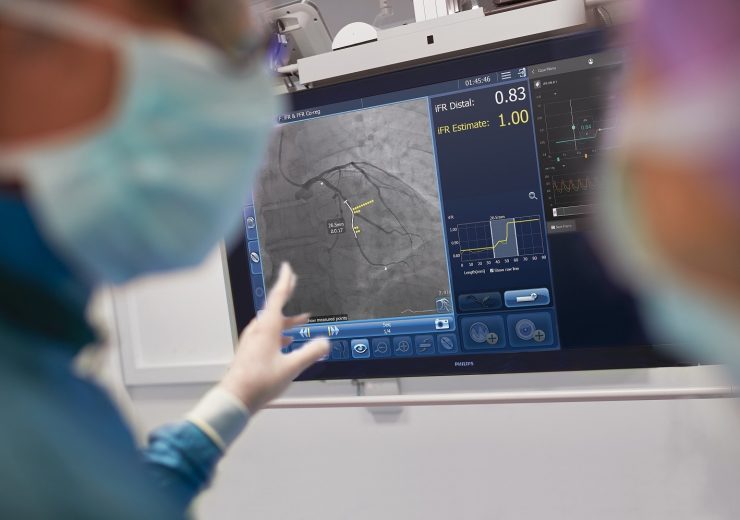The DEFINE GPS study will evaluate the effect of guidance by iFR measurements co-registered on the angiogram in PCI procedures

Philips enrols first patients in DEFINE GPS study. (Credit: Koninklijke Philips N.V.)
Royal Philips has started enrolling the first patients in DEFINE GPS, a global, multi-centre, prospective, randomised controlled study, at St. Francis Hospital, New York.
The study will evaluate the effectiveness of guidance by instantaneous wave-free ratio (iFR) measurements co-registered on the angiogram on percutaneous coronary intervention (PCI) procedures to open blocked coronary arteries.
PCI is an image-guided, minimally-invasive treatment to open a coronary artery blockage (stenosis) causing a reduced blood flow (ischemia) to heart tissue.
With an adaptive study design, DEFINE GPS is designed enrol to up to 3,200 participants across 100 sites across the world.
It is a follow-up to the DEFINE PCI study that evaluated the potential of treating residual ischemia in order to improve clinical outcomes for coronary stent patients.
DEFINE GPS trial principal investigator Dr. Allen Jeremias said: “Conducting rigorous clinical science is how we advance patient care, and, like the seminal FAME study that was carried out over 10 years ago, I believe DEFINE GPS has the potential to change the current standard of care in PCI.
“PCI has made a major positive impact on many coronary artery disease patients’ lives, but when we look back at all the major, high-quality stent trials over the past 20 years we see that around 20-30% of patients continue to have recurring chest pain at one year after receiving treatment.
“With DEFINE GPS we will be able to definitively determine if a physiology-based PCI approach results in superior patient outcomes compared to standard angioplasty.”
The DEFINE GPS trial will leverage iFR measurements in combination with Philips Image Guided Co-Registration System SyncVision, to enhance PCI guidance and treatment outcomes.
In the study, an iFR pullback measurement will be overlaid on the angiogram to provide more precise information on where to treat within the vessel.
The iFR pullback measurement leverages pressure wires to map the physiological profile of disease distribution along the length of the affected vessel.
Furthermore, study will also use iFR to determine whether the treatment is successful in restoring sufficient blood flow to prevent ischemia or any further treatment is required.
Philips senior vice president and image guided therapy devices general manager Chris Landon said: “iFR continues to be adopted in clinical practice, with mounting evidence that this innovative technology contributes to improved outcomes, reduced costs and enhanced patient experiences.
“This major study will provide a definitive answer to the question of whether a functional guidance strategy throughout the procedure demonstrates superior outcomes and reduces costs.
“The study has the potential to drive a significant improvement in clinical practice, and it’s a prime example of Philips’ commitment to providing a strong evidence base for the benefits of its healthcare innovations.”
